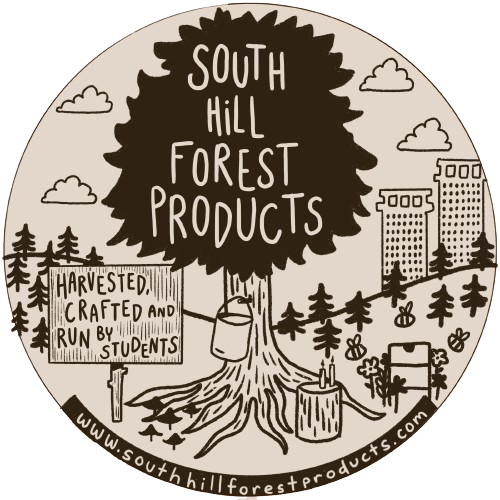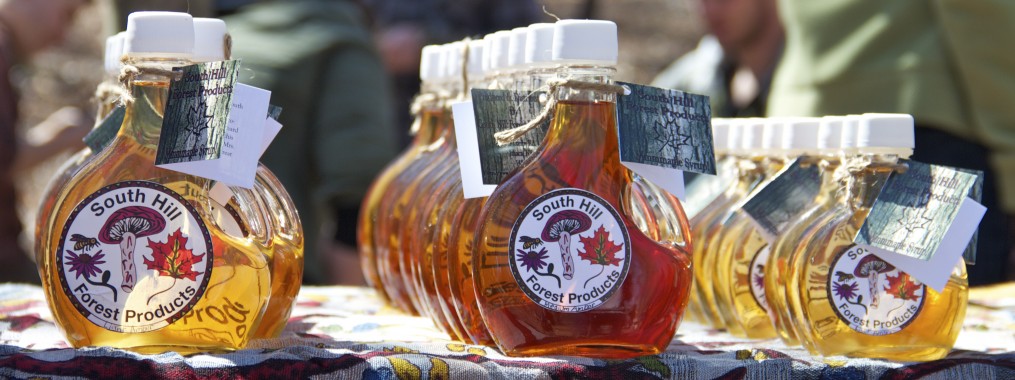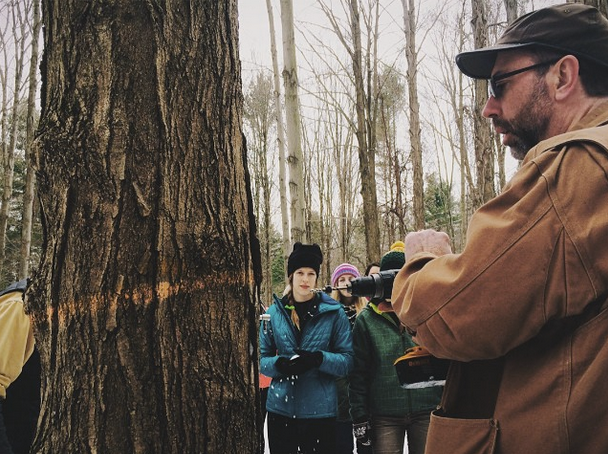History
“South Hill Forest Products was started in 2010, born of a series of coincidences, connections, and student enthusiasm.”
During an industry conference in 2004 in Portland, OR, our CFO and professor Jason Hamilton took a field trip to a local Non-Timber Forest Product (NTFP) producer, which focused mostly on harvesting shiitake mushrooms. Jason was inspired. Realizing that shiitake was a big NTFP in the Northeast as well, he wondered if he could work with shiitakes at Ithaca College.
At first, he worked with his research students to see if they could produce shiitakes. However, the project was too small with minimal success to do much with. At the time, Cornell had a class focusing on NTFPs. When Jason toured the class, he thought “why can’t we do this?” The only problem was he couldn’t center a whole class just around shiitakes.
At the same time, Kris Shapiro ‘09 (B.A. Philosophy) had the idea that he wanted to tap maple trees for syrup. He just didn’t know where on campus there was a high enough density of sugar maples to do so.
As a sophomore, he became fascinated with the idea of installing a wind turbine on Ithaca College campus, and was working closely with Jason and professor John Confer in the research. In order to obtain a permit, they needed to do a comprehensive ecological impact assessment, which involved examining a Cornell University study about the ecology of the Ithaca College Natural Lands.
Looking through the hundred-page document, Kris suddenly realized that a comprehensive study like that could tell him if there was a concentration of maples big enough to tap. “Sure enough, [I] found one section far away from campus, tucked into one of the remote corners of the property line, which contained a massively dense concentration of sugar maple trees,” Kris said.
After finding the perfect location for a sugar bush just a mile up the road from campus, Jason realized there was finally another NTFP that could be produced by Ithaca College students. It was enough to make a class out of, and so the course Farming the Forest was born.
The problem was, maple syrup is cost intensive to produce, even in a sugar bush with only 100 trees and a willing, free labor source. The course was just too expensive to run on the ENVS Department budget alone. The idea of selling the maple syrup as a fundraiser in order to pay for the production cost led the class to create South Hill Forest Products. The money raised from the ‘business’ would fundraise for the next year’s production.
After a few seasons of fundraising, Jason realized that running a business was itself a vital part of the experience. Students were learning hands-on, real-world skills, and developing a business acumen in a unique way. Now, learning business skills is a fundamental part of the South Hill Forest Products experience.
From there, the business grew each year. A student would come up with an idea - “have you ever heard of hickory syrup?” - and would figure out if it was reasonable to create a product line out of it. We added gifts from the bees from our campus apiary. We made crafts such as baskets, wood carvings, and medicinal salves. Each year, our team comes up with new ideas for Research & Development, and tests them out. You’ll find our R&D products at our open house, or in our extensive research logs. Maybe in future years, you’ll see a new bestseller thanks to our endlessly creative and driven students.
Over the course of our decade-long history, the students of Farming the Forest: Non-Timber Forest Products have created a thriving business from start to finish. They’ve been driven by the idea of educating folks about NTFPs and becoming industry professionals themselves. Though Jason had the original seed of the idea for a class such as this, he’ll be quick to tell you that each step of the way, it was student ideas that made the whole thing work. It’s amazing what a little passion, dedication, and creativity can create.
As Kris Shapiro says, “it’s an important lesson in life that people are more likely to be successful or come up with a great idea by getting involved and then applying the knowledge learned in a different and unique way.”
Thanks for being part of our journey!



